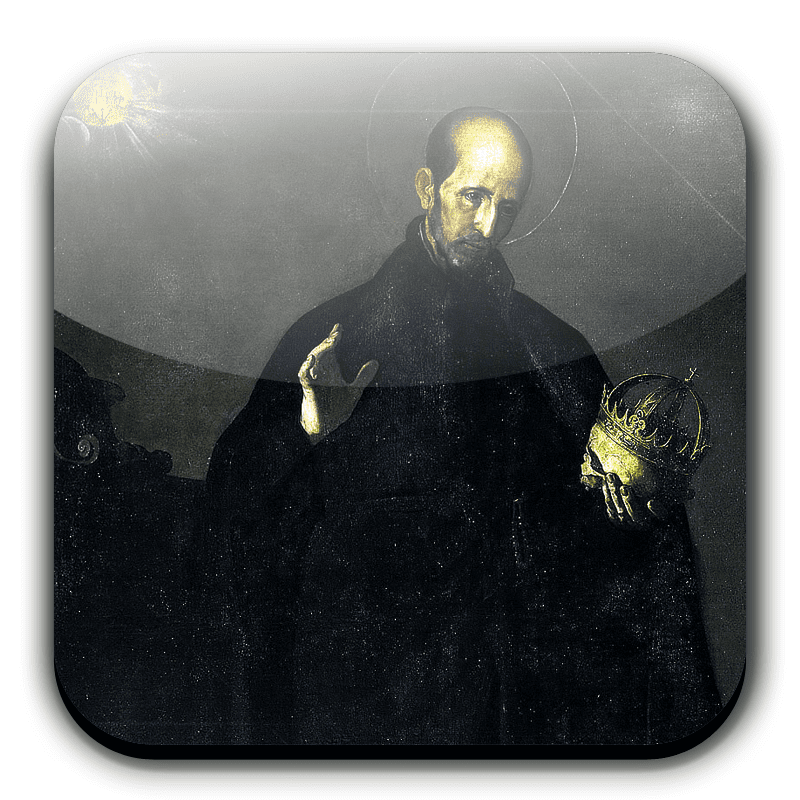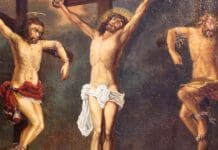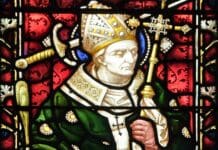St. Francis Borgia was born within the Duchy of Gandia, Valencia on October 28, 1510. He was the son of Juan de Borgia, the 3rd Duke of Gandia and Joana of Aragon, daughter of Afonso de Aragon, Archbishop of Zaragoza, who, in turn, was the illegitimate son of Ferdinand the Catholic (King Ferdinand II of Aragon) and his mistress Aldonza Ruiz de Iborra y Alemany. Francis was also the paternal great-grandson of Pope Alexander VI.
The future saint was unhappy in his ancestry. His grandfather, Juan Borgia, the second son of Pope Alexander VI, was assassinated in Rome on 14 June, 1497, by an unknown hand, which his family always believed to be that of Cæsar Borgia. Rodrigo Borgia, elected pope in 1402 under the name of Alexander VI, had eight children. The eldest, Pedro Luis, had acquired in 1485 the hereditary Duchy of Gandia in the Kingdom of Valencia, which, at his death, passed to his brother Juan, who had married Maria Enriquez de Luna. Having been left a widow by the murder of her husband, Maria Enriquez withdrew to her duchy and devoted herself piously to the education of her two children, Juan and Isabel. After the marriage of her son in 1509, she followed the example of her daughter, who had entered the convent of Poor Clares in Gandia, and it was through these two women that sanctity entered the Borgia family, and in the House of Gandia was begun the work of reparation to the Borgia family name which Francis Borgia was to crown.
Although as a child he was very pious and wished to become a monk, his family sent him instead to the court of the Emperor Charles V. He distinguished himself there, accompanying the Emperor on several campaigns and marrying, in Madrid in September 1526, a Portuguese noblewoman, Eleanor de Castro Melo e Menezes, by whom he had eight children: Carlos in 1530, Isabel in 1532, Juan in 1533, Álvaro circa 1535, Juana also circa 1535, Fernando in 1537, Dorotea in 1538, and Alfonso in 1539. In 1539, he convoyed the corpse of Empress Isabella of Portugal to her burial-place in Granada.
It is said that, when he saw the effect of death on the beautiful empress, he decided to “never again serve a mortal master.” However, while still a young man, he was made viceroy of Catalonia, and administered the province with great efficiency. His true interests, however, lay elsewhere. When his father died, the new Duke of Gandia retired to his native place and led, with his wife and family, a life devoted entirely to Jesus Christ and The Holy Catholic Church. In 1546 his wife Eleanor died and Francis was determined to enter the newly formed Society of Jesus. He put his affairs in order, renounced his titles in favor of his eldest son, Carlos, and became a Jesuit priest. Because of his high birth, great abilities and Europe-wide fame, he was immediately offered a cardinal’s hat. This, however, he refused, preferring the life of an itinerant preacher. In time, however, his friends persuaded him to accept the leadership role that nature and circumstances had destined him for: in 1554, he became the Jesuits’ commissary-general in Spain; and, in 1565, the third Father General or Superior General of the Society of Jesus.
His successes have caused historians to describe Francis as the greatest General after Saint Ignatius. He founded the Collegium Romanum, which was to become the Gregorian University, dispatched missionaries to distant corners of the globe, advised kings and popes, and closely supervised all the affairs of the rapidly expanding order. Yet, despite the great power of his office, Francis led a humble life, and was widely regarded in his own lifetime as a saint.ˇ
Francis Borgia died on September 30, 1572 in Rome. He was beatified in Madrid on November 23, 1624 by Pope Gregory XV. He was canonized nearly thirty five years later on June 20, 1670 by Pope Clement X.


















is it fitting perhaps that there is a “meet hot singles” advertisement accompanying this saint of the day?? What the heck is going on with that sort of stupidity on this web site!! Please remove it!
Dear Shelley,
Unfortunately, I don´t think that the authors of these notes can control the ads that appear on the side in this media. The challenge is not to get distracted by the world, in the web as in real life.
That said, to me St. Francis Borgia’s life is good triumphing against evil generation-wise. It was a blessing to learn about it. Keep up the good work.
Shelly
We do apologize. The ads on this page are automatically generated by Google. While we can do our best to filter ads, sometimes one less than fitting does get through.
ST FRANCIS BORGIA SEE US THROUGH IN OUR JOURNEY TOWARD OUR HOLY DESTINATION.
St Francis Borgia , please pray for us all those living in this house , all those needing prayers and all those working with us at CMU. Amen.